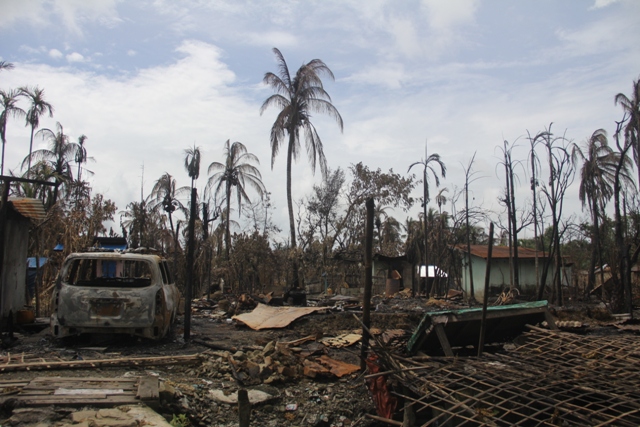We should not close our eyes when ethnic cleansing is happening. When people are incited by a deliberate and targeted campaign, as is happening in Myanmar, we should speak out against this deliberate campaign of ethnic cleansing. That is what PAX has also learned from its work at the Balkans, say PAX staff Miriam Struyk and Michel Uiterwaal.
In the Netherlands we celebrate the Peace Week around the International Day of Peace. It is a week full of activities like festive celebrations, debates about conflict and dialogue about our etnic or religious differences. This year’s theme ‘The power of Imagination’ borrowed a bit from Martin Luther Kings’ speech held in 1963 where he sketched a dream for a better future. But while we strive for peace, and are working together with local peace groups, we have to face that in many other places peace is far, far away.
The contrast could not be greater between the peace endeavors in The Netherlands with the horrific acts that are going on in Myanmar at the same time. With the entire world as eyewitnesses, horrendous human rights violations are being perpetrated against the Rohingya. PAX does not have partners in Myanmar nor Bangladesh, so we rely on public sources of information many of which we view as particularly credible. In Amnesty International’s view (pdf) what we are witnessing in Rakhine State is “ethnic cleansing, and in legal terms crimes against humanity, in particular the crimes of murder and deportation or forcible transfer of population.”
With PAX being a peace movement and an outsider to the terrible plight that the Rohingya are facing, we feel a need to react but don’t know how. We are appalled and shocked, but how to turn the outrage on the ethnic cleansing taking place and the compassion that we feel for the Rohingya into action? We cannot stand silent when ‘a textbook example of ethnic cleansing’ is going on, as the UN special rapporteur on human rights in Myanmar has described it (pdf).
From our work on the Balkans for example, we know how much impact it has on societies when there is a deliberate campaign of ethnic cleansing. The examples from interviews with Rohingyas who fled Myanmar that are given in an OHCHR report of February this year, describe systematic targeting of people because of the group they belong and the entire rhetoric of the Myanmar military is clear in that they want all Rohingya out of Rakhine.
The testimonies given by Rohingya are horrific: Women and men are separated. Men are beaten, often taken away by police or the military, and disappear. Many women are raped or assaulted. People fleeing are shot at, and there are summary executions of groups of people including babies, children, women and elderly people. The stories of men being tortured, shot dead and burnt right in front of their family members are horrific to read. If one really lets the image in, is almost unbearable.
These testimonies now given by Rohingya are horrific and – at the same time – sound so familiar to what we have heard before, in Bosnia for example leading up to the genocide in Srebrenica. When people are incited by a deliberate and targeted campaign, this changes the relationship between groups for generations – or more. In the systematic way this process of ‘othering’ and the targeted killing is used by the Myanmar army and government, it is “central to the genocidal process” as Alicia de la Cour Venning describes it in an article ‘Rohingya crisis: this is what genocide looks like’ published on September 15 on the website The Conversation.
While there are still lives to be saved, we should not be silently standing by watching this happen. Public outcry is important, still at this moment, when linked to a call for concerted international action. It is important to speak out when such horrendous acts are happening and it is good to see that NGO’s such as Human Rights Watch and Amnesty International document these war crimes and take eyewitness statements. Together with others PAX will continue its work to reiterate the global laws of war that prohibit exactly the targeted killing of civilians that is now happening. Together, we have to work harder towards an international order where people are protected and that if this does not happen, the concept of the responsibility to protect is uphold.
PAX is not working in that region, but we cannot close our eyes for what is – once more – happening and while we celebrate Peace Week, the atrocities happening right now should encourage us all ‘not to close our eyes’ but to find ways to better protect people and to uphold international humanitarian law and human rights.




